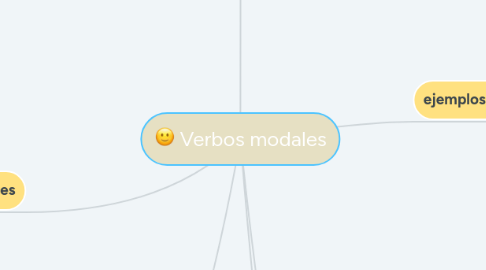
1. caracteristicas
1.1. categoría de verbos auxiliares
1.2. se usan con verbos principales
1.2.1. para formar afirmaciones o preguntas
1.3. no tienen conjugaciones ni tiempo
1.3.1. no se puede usar sin verbo principal
1.4. siempre terminan en la misma forma
1.5. modifican el significado del verbo principal
1.6. pueden ir delante del sujeto
1.6.1. en oraciones interrogativas
1.7. no pueden llevar to
1.7.1. excepto en ought to, be able to, have to
2. verbos modales
2.1. can
2.1.1. expresa habilidad
2.2. must
2.2.1. indica
2.2.1.1. obligacion
2.2.1.2. prohibición
2.2.1.3. necesidad
2.3. might
2.3.1. expresa posibilidad remota
2.4. should
2.4.1. obligación moral
2.5. ought to
2.5.1. indica una obligación moral
2.6. have to
2.6.1. expresa tener que hacer algo
2.7. would
2.8. could
2.8.1. pasado de can
2.9. be able
2.9.1. poder o saber hacer algo
3. expresan
3.1. capacidad
3.2. posibilidad
3.3. necesidad
3.4. otra condición del verbo principal
4. son
4.1. auxiliares
4.2. no pueden funcionar como un verbo
5. estructura gramatical
5.1. forma positivia
5.1.1. sujeto+verbo modal+verbo principal (infinitivo)+complemento
5.2. forma negativa
5.2.1. sujeto+verbo modal+not+verbo principal+complemento
5.3. forma interrogativa
5.3.1. verbo modal+sujeto+verbo principal+complemento+?
6. ejemplos verbos modales
6.1. can
6.1.1. afirmativa
6.1.1.1. you can play soccer
6.1.2. negativa
6.1.2.1. you can not play soccer
6.1.3. interrogativa
6.1.3.1. can do you play soccer?
6.2. should
6.2.1. afirmativa
6.2.1.1. she shoul run in the park
6.2.2. negativa
6.2.2.1. she sholud not run in the park
6.2.3. interrogativa
6.2.3.1. should do she run in the park
6.3. could
6.3.1. afirmativa
6.3.1.1. i could cook
6.3.2. negativa
6.3.2.1. i could not cook
6.3.3. interrogativa
6.3.3.1. could I cook?
6.4. must
6.4.1. afirmativa
6.4.1.1. you must drees the uniform
6.4.2. negativa
6.4.2.1. you must not drees the uniform
6.4.3. interrogativa
6.4.3.1. must do you drees the uniform
6.5. might
6.5.1. afirmativa
6.5.1.1. i might cook
6.5.2. negativa
6.5.2.1. i might not cook
6.5.3. interrogativa
6.5.3.1. might i cook?
6.6. have
6.6.1. afirmativa
6.6.1.1. i have to study for my exam
6.6.2. negativa
6.6.2.1. i dont have to estudy for my exam
6.6.3. interrogativa
6.6.3.1. do i have to study for my exam?
6.7. be able
6.7.1. afirmativa
6.7.1.1. you are able to cook cakes
6.7.2. negativa
6.7.2.1. you arent able to cook cakes
6.7.3. interrogativa
6.7.3.1. are you hable to cook cakes?
6.8. ought
6.8.1. afirmativa
6.8.1.1. i ougth to work in my homework
6.8.2. negativa
6.8.2.1. i ought not to homework in my homework
6.8.3. interrogativa
6.8.3.1. cought i to homework in my homewor?
6.9. would
6.9.1. afirmatvai
6.9.1.1. i would study in the university
6.9.2. negativa
6.9.2.1. i wouldnt study en the university
6.9.3. would i study in the university?
